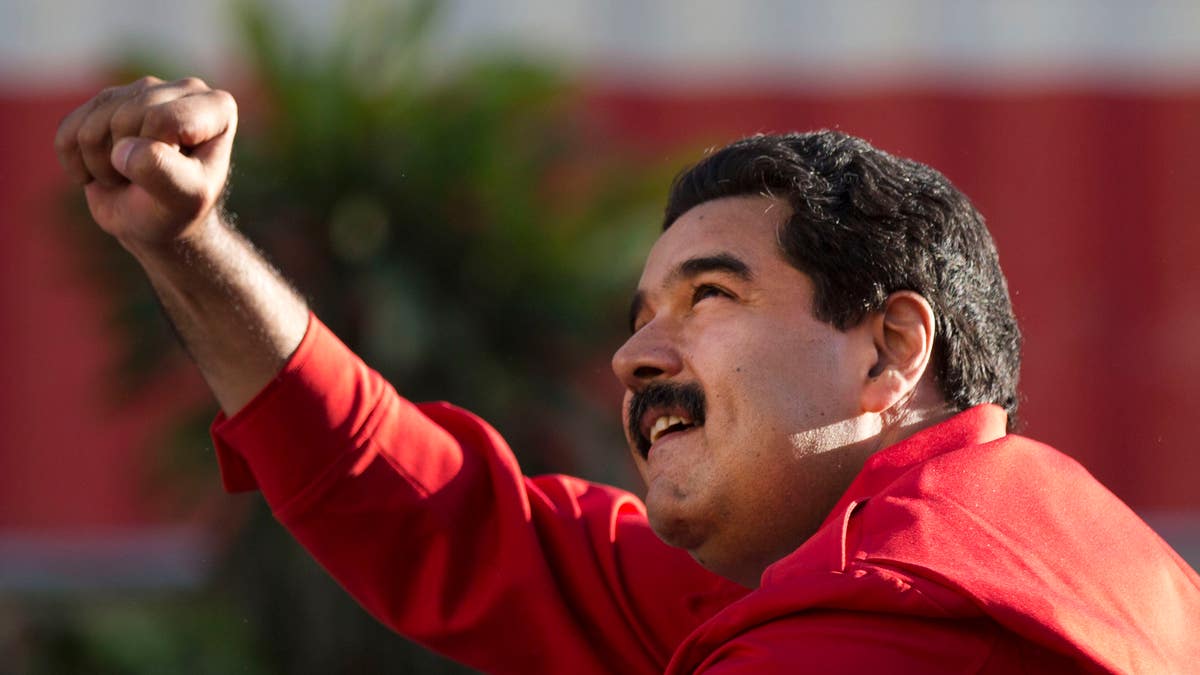
President Maduro gestures to supporters on Dec. 1, 2015, in the popular neighborhood of Petare, in Caracas. (ap)
Caracas, Venezuela – Venezuela’s ruling party filed motions to dispute the election of eight lawmakers from the opposition coalition, which on Dec. 6 obtained a majority with enough power to rein in President Nicolás Maduro, sack Cabinet ministers and even call an assembly to rewrite Hugo Chávez's 1999 constitution.
The government’s party needs to succeed in unseating just one of the eight elected lawmakers to take away the so-called supermajority from the opposition.
The motions were filed Tuesday before the Supreme Court, just days after the government appointed 13 new justices — including two of the five justices from the Sala Electoral, the panel charged with all electoral issues.
“We are seeing a judicial coup in the making,” alerted Jesús Torrealba, secretary of the opposition’s Democratic Unity Roundtable, soon after news of the motions came out.
The new National Assembly is set to be sworn in on Jan 5.
- Venezuela’s Chavistas vow to continue fighting
- Strike puts 300K Venezuelans undergrads on hold
- Venezuela’s opposition celebrates landslide win in historic election
- Venezuela’s ruling party handpicks 13 supreme justices, paving way for conflict
- Reckless giveaway of Venezuela’s oil needs to stop, opposition says
- Report: Venezuela’s homicide rate climbs, may rival El Salvador’s for highest in world
Constitutional lawyers Jesús María Casal and Carlos Ayala Corao told Fox News Latino that there is not enough time for the Supreme Court to prepare a strong case before that date, and yet the opposition is not ruling out any possibility.
“We are in a country with no rule of law, and anything could happen,” Torrealba said. “For example, the Supreme Court was on vacation but they opened up just to receive this case.”
"We're living in a country where you can be surer about the operating hours of a liquor store than the elections tribunal of the Supreme Court," he added.
All five justices from the high court’s electoral panel have strong links to PSUV, the ruling socialist party. One of two justices appointed to the Sala Electoral last week, Fanny Márquez, has worked closely to Diosdado Cabello, Chavismo’s number two, for over a decade. The other one, Christian Zerpa, used to be a PSUV representative and is said to have ties to Tarek El Aissami, governor of a state – Aragua – where three opposition lawmakers are being contested.
The Supreme Court is required to announce whether it will admit the motions before the end of the week. If that’s the case, an investigation will be open, and the elections could be repeated in those places.
When the opposition challenged 2013's presidential election, the Supreme Court didn’t admit the case.
However, political analysts say there is a chance the government’s move to seek a re-vote backfires.
“The government might lose again and for even a larger margin,” analyst Edgard Gutiérrez told FNL.
“In places where the opposition won by three or more points I think the government doesn’t stand a chance,” said Jesús Seguias, another analyst consulted by FNL. “It will be more challenging where the margins were smaller,” he said.
The eight lawmakers being contested hail from six different districts. In four of them the opposition won by less than a three-point margin.
But the opposition’s winners are still confident in their chances if the voting is repeated.
“If that happens, I will win by more votes. People are upset with the economic crisis and in my district the voters didn’t like the candidate from the ruling party,” said Karim Salanova, who won Aragua’s third district by just 82 votes.
Gutiérrez said the ruling party’s latest moves – which include emergency sessions to ram through the 13 Supreme Court appointments and set up a parallel assembly comprised of grassroots activists – might also be aimed at trying to polarize the country and further divide the opposition.
The opposition coalition is marked by two distinct currents — one eager to find ways to change the government as soon as possible, and one that favors a slower pace in order to consolidate popular support.
If the government keeps its radical tone, analysts say, the differences between the two currents could deepen as it did in early 2014, when Leopoldo López’s political party sparked a round of street protests.
With reporting by the Associated Press.
